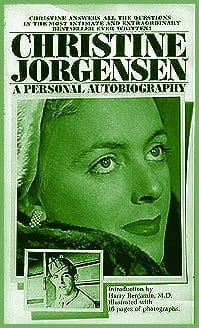For decades across North America, transgendered and transsexual people have had to struggle in a hostile climate against assigned gender categories of femaleness and maleness.
In 1952, ex-soldier Christine Jorgensen weathered international media scrutiny of her “sex change” in Denmark to become a successful actress and singer, performing at Vancouver’s Cave Supper Club in 1956. In the 1970s, eye surgeon Renée Richards fought to compete on the women’s professional tennis circuit, and ex-soldier Jan Morris began her decorated career as a travel writer.
Cheered by recent victories, yet wary of backlash, Kate Bornstein in Gender Outlaw reminds us that trans folks in the 1950s “were pressured into hiding deep within the darkest closets they could find. Those who came out of their closets were either studied under a microscope, ridiculed in the tabloids or made exotic in the porn books.” Decades later, mainstream media continue to paint transsexuals and transgenders as sick, deviant and dangerous, in need of medical treatment. Recall films that trade on tragic or comic stereotypes: Tootsie, Freebie And The Bean, The Silence Of The Lambs, The Crying Game, Kiss Of The Spider Woman and Mrs Doubtfire.
Academic feminist Janice Raymond has belched out her own transphobic bile. In Raymond’s surprisingly influential 1979 book, Transsexual Empire: The Making Of The She/Male, she lambastes male-to-female transsexuals as reactionary dupes of surgical mutilation who aim to steal women’s creative power and make “real” women obsolete. In 1995, hoodwinked by Raymond’s conspiratorial rhetoric, Vancouver’s Rape Relief Society disqualified transsexual Kimberly Nixon from training for volunteer counselling on the grounds that she wasn’t socialized as a girl/woman, and “as a man” was incapable of empathy towards sexually assaulted women.
This winter, after seven patient years, Nixon, teamed with her sage lawyer, Barbara Findlay, won her case against Rape Relief’s discriminatory practises. In a brave, meticulously worded decision, BC Human Rights Tribunal Chair Heather MacNaughton accepted that Nixon had been hurt and humiliated, and awarded her $7,500 for injury to her dignity, feelings and self-respect. MacNaughton ordered that Rape Relief refrain from committing the same or similar contravention of a transsexual woman’s right to volunteer in the future.
My abiding admiration for Nixon’s courage arises out of my own experience. In 1982, as a volunteer with the Kingston Sexual Assault Centre, I answered a crisis call from a trans woman I’ll call Darlene. We met secretly for several years: Darlene afraid of rejection by family and employer, and me afraid of being labelled a “male-identified” traitor by my feminist sisters. Our friendship, which we sustained for years after I left Kingston, was founded on mutual respect and a shared feminist goal to stop men’s violence. Like a loving gardener, Darlene planted the seed of my own pro-trans consciousness.
Since 1982 I’ve seen an outpouring of trans artistic, cultural and activist energy around the globe. Compelling documentary films and videos have put first-person experiences of trans people at the centre of the story. I recommend books like In The Wrong Body, You Don’t Know Dick, Transit, and Gender Line-Extended. One of the few to explore gender diversity in a non-western context is Paradise Bent about fa’afafines-boys raised “in the manner of a woman” in Samoan culture. As in other First Nations pre-colonization, the fa’afafines were, and still are, accepted as two-spirits who embrace feminine appearance and women’s roles as caregivers, teachers, and housekeepers.
All of us produce our genders. Many of us behave in ways we’ve learned are appropriate for pink or blue conformity. Many others, to varying degrees, resist and rebel against binding norms.
Unlike my childhood playmate, Cindy, I was never barred by my parents from playing basketball because I refused to wear a dress. Unlike butches I’ve loved, I’ve never had my nose broken or been hospitalized by the bloody blows of a threatened male goon. And unlike trans women, I’ve never been accused of violating the “safe space” of the women’s community.
But witnessing the flouting of gender scripts by butches and trans comrades, I know that views of gender as universal, biologically fixed, and unchangeable are wrong-headed.
Hell, if genetic women are “essentially” nurturant and empathetic, how do we account for the Margaret Thatchers of the world?
Non-trans folks have much to learn from trans freedom fighters. I’m heartened by the mounting pro-trans solidarity among feminists and queers nation-wide. It’s time to listen up: Trans folks are increasingly loud, they’re proud, and they’re not going away.
* The next Half Cocked, the only regular trans party in town, is Fri, May 17 at Talullah’s Cabaret (12 Alexander St). Becki Ross writes for Xtra’s Vancouver sibling, Xtra West.

 Why you can trust Xtra
Why you can trust Xtra


